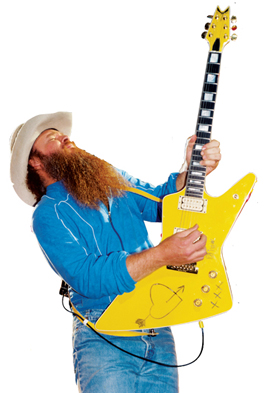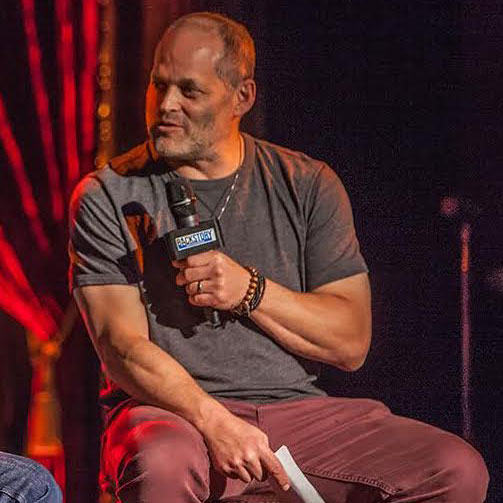

Billy Gibbons recalls three decades of Texas excess.
“LA GRANGE”
Tres Hombres (1973)
“That is straight guitar into amp: a 1955 Strat with a stop tailpiece through a 1969 Marshall Super Lead 100. That fuzz sound in the lead and in the front and back end of the composition is just pure tube distortion. Pickup-setting differentials account for the different tones. The opening part was played on what we used to call ‘the mystery setting’ in the dark days before the existence of the five-way toggle switch, when finding that perfect ’tweener [in-between setting of a three-way pickup selector] required dedication.
“That Marshall amp, which was a trusted friend through the first six records, was an import brought over by Jeff Beck’s at-thetime tech. I had four of those babies, and they were my main road amps for years. I ran them through cabinets with those [Celestion] Greenback speakers. They still retain a distinctive, rich, enjoyable tone and are well worth owning. I must, however, advise anyone fortunate enough to find one to beware of the variable power plugs. The 220[-volt] setting doesn’t work very well outside of the 220 countries, as I can tell you from experience. We had more than a few paper-clip nights over the years [due to blown fuses].”
“TUSH”
Fandango! (1975)
Get The Pick Newsletter
All the latest guitar news, interviews, lessons, reviews, deals and more, direct to your inbox!
“The first three albums were recorded exclusively at the Robin Hood Studios outside of Dallas, and the special sound that always seemed to be accessible there was due in part to the fact that the equipment was nailed to the floor and nothing ever moved so you could always count on a sound. Quite a good sound, I must say.
“‘Tush’ was Pearly Gates, my beloved Les Paul, played through the same Marshall Super Lead, and we sure enough did stop and enjoy the G tuning for the composition’s slide element. This song was largely straight guitar to amp, but I also utilized a real odd, esoteric device called the Cooper Time Cube, which was a simplistic application of the complex world of physics. In a small rack-mounted can sits a small speaker, right up next to maybe 50 feet of one-inch rubber tubing, which is coiled, spring-like. The sound waves actually take longer to travel, having to make these corners, creating a type of delay which is quite unlike the familiar sound of a digital delay. That was a real left-field piece of gear which they had—and still have, I might add— in that studio. Some of the guitar sounds that appear to be doubled on the early albums are actually the byproduct of that oddball Cooper Time Cube.”
“I’M BAD, I’M NATIONWIDE”
Deguello (1979)
“We wrote this about the great Texas bluesman Joey Long, a Gulf Coast lead-guitar picker who appeared on a great number of wonderful records by the likes of Slim Harpo and Barbara Lynn. He played on Lynn’s great hit record ‘We Got a Good Thing Going,’ which was covered by the Stones, and which was really one of the important recordings that shaped my understanding of where it was I wanted to go with my life. It was good. And so was he.
“Joey loaned me a multi-stringed mandolin- like instrument from Parral, Mexico, and I put it to good use on ‘Nationwide.’ If you listen closely, you can hear closemiked mandolin-sounding rhythm accompaniment. The lead track was played on a custom-made, half-size, real short-scaled guitar tuned to G. It was actually standard tuning cranked up a minor third, which remained quite playable thanks to the guitar’s short scale.
“The song’s tail end alternates between three distinct effects created by two pedals: an Echoplex doubler and a Maestro octave box alternating every third bar between having the octave up and the octave down. The song also contains some Hohner Clavinet, which was owned by one of our famous Memphis pals, Carlos De Marlos. It’s such an interesting sound that it ignited Dusty’s [Hill, bassist] interest in learning some keyboard skills, and it was he who subsequently handled all the tickling of the ivories.”
“CHEAP SUNGLASSES”
Deguello (1979)
“This song was actually written during a trip from the Gulf Coast up to Austin, Texas. A bright spot of creativity flared as we were passing the hamlet of La Grange, and I recited all three verses of ‘Cheap Sunglasses’ within the space of 20 miles. And that’s the way they stayed. Though that may sound simplistic, the lyrics speak for themselves. ‘Simplistic’ is indeed a word which may come to the minds of some.
“The lead track was performed on a fake Fender guitar, which I used for the wiggle stick—there is a little dive bomb in the solo section. I played it through a Marshall Major, a short-lived 200-watt beast, which had one blown tube. Hence the rather bulbous, rotund sound. There’s also a little bit of digital delay for that Bo Diddley impersonation at the tail out, and a Maestro Ring Modulator, which produces the strange tag to each verse. It appears three times, and it’s a pretty funny sound. That is one insane effect put to good use.”
Alan Paul is the author of three books, Texas Flood: The Inside Story of Stevie Ray Vaughan, One Way Way Out: The Inside Story of the Allman Brothers Band – which were both New York Times bestsellers – and Big in China: My Unlikely Adventures Raising a Family, Playing the Blues and Becoming a Star in Beijing, a memoir about raising a family in Beijing and forming a Chinese blues band that toured the nation. He’s been associated with Guitar World for 30 years, serving as Managing Editor from 1991-96. He plays in two bands: Big in China and Friends of the Brothers, with Guitar World’s Andy Aledort.









![John Mayer and Bob Weir [left] of Dead & Company photographed against a grey background. Mayer wears a blue overshirt and has his signature Silver Sky on his shoulder. Weir wears grey and a bolo tie.](https://cdn.mos.cms.futurecdn.net/C6niSAybzVCHoYcpJ8ZZgE.jpg)
